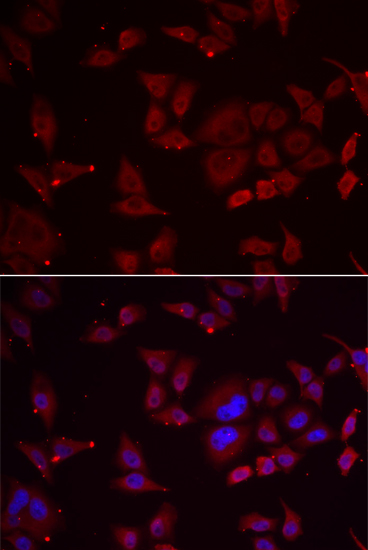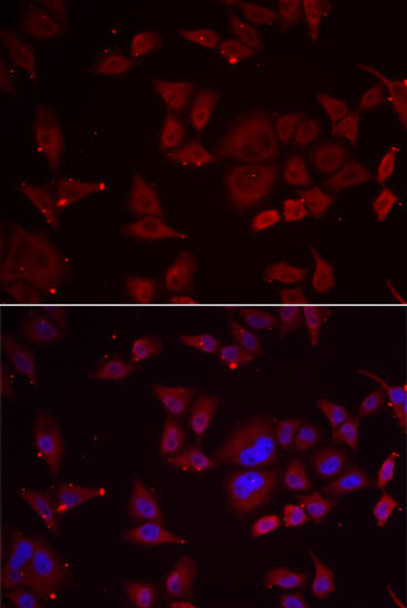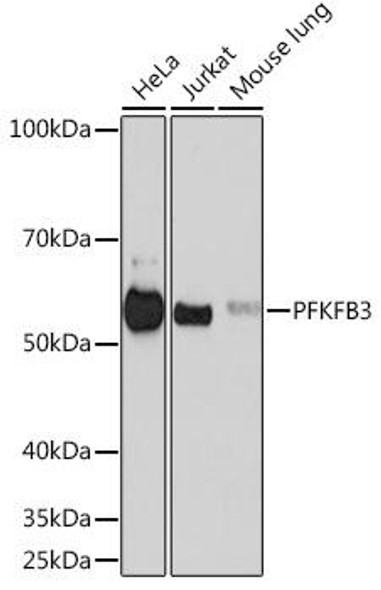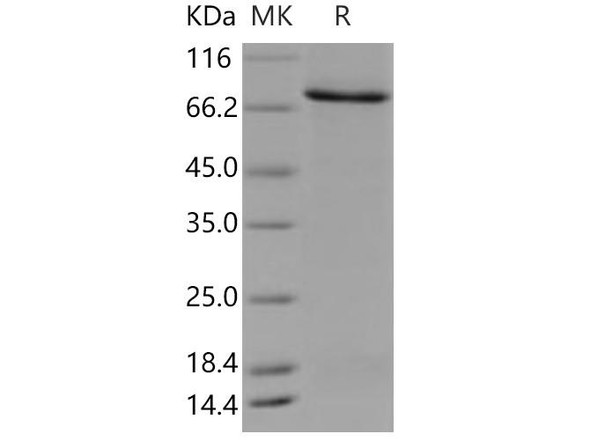Description
Anti-PFKFB3 Antibody (CAB14764)
The PFKFB3 Polyclonal Antibody (CAB14764) is a valuable tool for researchers studying PFKFB3, a key enzyme involved in glycolysis and cancer metabolism. This antibody is produced in rabbits and has high specificity for human samples, making it ideal for use in Western blot applications. By binding to the PFKFB3 protein, this antibody enables precise detection and analysis in various cell types, providing insights into the role of PFKFB3 in cancer progression and metabolism.
PFKFB3 is known for its crucial function in regulating glucose metabolism and promoting cancer cell growth. Its overexpression has been linked to aggressive tumor behavior and poor prognosis in cancer patients, highlighting its potential as a therapeutic target. Research on PFKFB3 is vital for understanding the metabolic adaptations that drive cancer development and progression, offering opportunities for developing novel anti-cancer strategies targeting this enzyme.
| Antibody Name: | Anti-PFKFB3 Antibody |
| Antibody SKU: | CAB14764 |
| Antibody Size: | 20uL, 50uL, 100uL |
| Application: | WB IF |
| Reactivity: | Human, Mouse |
| Host Species: | Rabbit |
| Immunogen: | Recombinant fusion protein containing a sequence corresponding to amino acids 1-210 of human PFKFB3 (NP_004557.1). |
| Application: | WB IF |
| Recommended Dilution: | WB 1:500 - 1:2000 IF 1:50 - 1:200 |
| Reactivity: | Human, Mouse |
| Positive Samples: |
| Immunogen: | Recombinant fusion protein containing a sequence corresponding to amino acids 1-210 of human PFKFB3 (NP_004557.1). |
| Purification Method: | Affinity purification |
| Storage Buffer: | Store at -20'C. Avoid freeze / thaw cycles. Buffer: PBS with 0.02% sodium azide, 50% glycerol, pH7.3. |
| Isotype: | IgG |
| Sequence: | MPLE LTQS RVQK IWVP VDHR PSLP RSCG PKLT NSPT VIVM VGLP ARGK TYIS KKLT RYLN WIGV PTKV FNVG EYRR EAVK QYSS YNFF RPDN EEAM KVRK QCAL AALR DVKS YLAK EGGQ IAVF DATN TTRE RRHM ILHF AKEN DFKA FFIE SVCD DPTV VASN IMEV KISS PDYK DCNS AEAM DDFM KRIS CYEA SYQP LDPD KCDR DL |
| Gene ID: | 5209 |
| Uniprot: | Q16875 |
| Cellular Location: | |
| Calculated MW: | 57kDa/58kDa/59kDa/60kDa |
| Observed MW: | Refer to figures |
| Synonyms: | PFKFB3, IPFK2, PFK2, iPFK-2 |
| Background: | The protein encoded by this gene belongs to a family of bifunctional proteins that are involved in both the synthesis and degradation of fructose-2, 6-bisphosphate, a regulatory molecule that controls glycolysis in eukaryotes. The encoded protein has a 6-phosphofructo-2-kinase activity that catalyzes the synthesis of fructose-2, 6-bisphosphate (F2, 6BP), and a fructose-2, 6-biphosphatase activity that catalyzes the degradation of F2, 6BP. This protein is required for cell cycle progression and prevention of apoptosis. It functions as a regulator of cyclin-dependent kinase 1, linking glucose metabolism to cell proliferation and survival in tumor cells. Several alternatively spliced transcript variants encoding different isoforms have been found for this gene. |
| UniProt Protein Function: | PFKFB3: Synthesis and degradation of fructose 2,6-bisphosphate. Ubiquitous. 2 isoforms of the human protein are produced by alternative splicing. |
| UniProt Protein Details: | Protein type:Kinase, other; Motility/polarity/chemotaxis; Carbohydrate Metabolism - fructose and mannose; EC 3.1.3.46; Phosphatase (non-protein); EC 2.7.1.105 Chromosomal Location of Human Ortholog: 10p15.1 Cellular Component: cytosol; nucleoplasm Molecular Function:6-phosphofructo-2-kinase activity |
| NCBI Summary: | The protein encoded by this gene belongs to a family of bifunctional proteins that are involved in both the synthesis and degradation of fructose-2,6-bisphosphate, a regulatory molecule that controls glycolysis in eukaryotes. The encoded protein has a 6-phosphofructo-2-kinase activity that catalyzes the synthesis of fructose-2,6-bisphosphate (F2,6BP), and a fructose-2,6-biphosphatase activity that catalyzes the degradation of F2,6BP. This protein is required for cell cycle progression and prevention of apoptosis. It functions as a regulator of cyclin-dependent kinase 1, linking glucose metabolism to cell proliferation and survival in tumor cells. Several alternatively spliced transcript variants encoding different isoforms have been found for this gene. [provided by RefSeq, Apr 2016] |
| UniProt Code: | Q16875 |
| NCBI GenInfo Identifier: | 3023733 |
| NCBI Gene ID: | 5209 |
| NCBI Accession: | Q16875.1 |
| UniProt Secondary Accession: | Q16875,O43622, O75902, Q5VX15, Q5VX18, Q5VX19, B7Z955 |
| UniProt Related Accession: | Q16875 |
| Molecular Weight: | 60,602 Da |
| NCBI Full Name: | 6-phosphofructo-2-kinase/fructose-2,6-bisphosphatase 3 |
| NCBI Synonym Full Names: | 6-phosphofructo-2-kinase/fructose-2,6-biphosphatase 3 |
| NCBI Official Symbol: | PFKFB3 |
| NCBI Official Synonym Symbols: | PFK2; IPFK2; iPFK-2 |
| NCBI Protein Information: | 6-phosphofructo-2-kinase/fructose-2,6-bisphosphatase 3 |
| UniProt Protein Name: | 6-phosphofructo-2-kinase/fructose-2,6-bisphosphatase 3 |
| UniProt Synonym Protein Names: | 6PF-2-K/Fru-2,6-P2ase brain/placenta-type isozyme; Renal carcinoma antigen NY-REN-56; iPFK-2Including the following 2 domains:6-phosphofructo-2-kinase (EC:2.7.1.105)Fructose-2,6-bisphosphatase (EC:3.1.3.46) |
| Protein Family: | 6-phosphofructo-2-kinase/fructose-2,6-bisphosphatase |
| UniProt Gene Name: | PFKFB3 |
| UniProt Entry Name: | F263_HUMAN |
 | Immunofluorescence analysis of U2OS cells using PFKFB3 antibody (CAB14764). Blue: DAPI for nuclear staining. |








